List of US Presidents (ABW): Difference between revisions
Jump to navigation
Jump to search
No edit summary |
No edit summary |
||
| (17 intermediate revisions by the same user not shown) | |||
| Line 310: | Line 310: | ||
! scope=row | {{wp|Presidency of Theodore Roosevelt|26}} | ! scope=row | {{wp|Presidency of Theodore Roosevelt|26}} | ||
| [[File:Theodore Roosevelt by the Pach Bros.jpg|150px]] | | [[File:Theodore Roosevelt by the Pach Bros.jpg|150px]] | ||
| data-sort-value="Roosevelt, Theodore" | '''{{wp|Theodore Roosevelt}}''' | | data-sort-value="Roosevelt, Theodore" | '''{{wp|Theodore Roosevelt}}'''{{efn|At 11 years and 5 months long, {{wp|Theodore Roosevelt}} formerly held the record for the longest serving {{wp|American}} president, having served two full terms in addition to completing the remainder of the term of his slain predecessor {{wp|William McKinley}}. However, he would later be surpassed by his fifth cousin {{wp|Franklin D. Roosevelt}}, a {{wp|Democratic Party (United States)|Democrat}}, with the latter serving as president for roughly twelve years long, a record that is unlikely to be surpassed given the subsequent introduction of two-term limits for presidents.}}<br>{{Small|(1858–1919)}}<br> | ||
| {{dts|September 14, 1901}}{{efn|Theodore Roosevelt succeeded to the presidency upon the death of William McKinley.}}<br/>–<br/>{{dts|March 4, 1913}} | | {{dts|September 14, 1901}}{{efn|Theodore Roosevelt succeeded to the presidency upon the death of William McKinley.}}<br/>–<br/>{{dts|March 4, 1913}} | ||
| style="background-color:{{party color|Republican Party (United States)}}" | | | style="background-color:{{party color|Republican Party (United States)}}" | | ||
| Line 338: | Line 338: | ||
|- | |- | ||
! scope=row | {{wp|Presidency of | ! scope=row | {{wp|Presidency of Leonard Wood|28}} | ||
| [[File: | | [[File:Leonard Wood, administrator, soldier, and citizen (1920) (14579077497).jpg|150px]] | ||
| data-sort-value=" | | data-sort-value="Wood, Leonard" | '''{{wp|Leonard Wood}}'''<br>{{Small|(1860–1927)}}<br> | ||
| {{dts|March 4, 1921}}<br/>–<br/>{{dts|August | | {{dts|March 4, 1921}}<br/>–<br/>{{dts|August 7, 1927}}{{efn|name=diedintraterm}} | ||
| style="background-color:{{party color|Republican Party (United States)}}" | | | style="background-color:{{party color|Republican Party (United States)}}" | | ||
| {{wp|Republican Party (United States)|Republican}} | | {{wp|Republican Party (United States)|Republican}} | ||
| {{wp|1920 United States presidential election|1920}} | | {{wp|1920 United States presidential election|1920}} | ||
| {{wp| | ---- | ||
{{wp|1924 United States presidential election|1924}} | |||
| {{wp|Warren G. Harding}}{{efn|name=diedintraterm}} | |||
---- | |||
''Vacant after<br/>August 23, 1923'' | |||
---- | |||
{{wp|Henry L. Stimson}} | |||
|- | |- | ||
! scope=row | {{wp|Presidency of | ! scope=row | {{wp|Presidency of Henry L. Stimson|29}} | ||
| [[File: | | [[File:Henry Stimson, Harris & Ewing bw photo portrait, 1929.jpg|150px]] | ||
| data-sort-value=" | | data-sort-value="L. Stimson, Henry" | '''{{wp|Henry L. Stimson}}'''<br>{{Small|(1867–1950)}}<br> | ||
| {{dts|August | | {{dts|August 7, 1927}}{{efn|Henry L. Stimson succeeded to the presidency upon the death of Leonard Wood.}}<br />–<br />{{dts|March 4, 1933}} | ||
| style="background-color:{{party color|Republican Party (United States)}}" | | | style="background-color:{{party color|Republican Party (United States)}}" | | ||
| {{wp|Republican Party (United States)|Republican}} | | {{wp|Republican Party (United States)|Republican}} | ||
| {{gray|{{endash}}}} | | {{gray|{{endash}}}} | ||
---- | ---- | ||
{{wp| | {{wp|1928 United States presidential election|1928}} | ||
| ''Vacant through<br/>March 4, | | ''Vacant through<br/>March 4, 1929'' | ||
---- | ---- | ||
{{wp|Charles | {{wp|Charles Curtis}} | ||
|- | |- | ||
! scope=row | {{wp|Presidency of Franklin D. Roosevelt|30}} | |||
! scope=row | {{wp|Presidency of Franklin D. Roosevelt| | |||
| [[File:FDR 1944 Color Portrait.jpg|150px]] | | [[File:FDR 1944 Color Portrait.jpg|150px]] | ||
| data-sort-value="Roosevelt, Franklin D" | '''{{wp|Franklin D. Roosevelt}}''' | | data-sort-value="Roosevelt, Franklin D" | '''{{wp|Franklin D. Roosevelt}}'''{{efn|As the longest serving {{wp|American}} president in history at twelve years long, {{wp|Franklin D. Roosevelt}}, a {{wp|Democratic Party (United States)|Democrat}}, surpassed the previous record held by his fifth cousin and {{wp|Republican Party (United States)|Republican}} politician {{wp|Theodore Roosevelt}}. In this, {{wp|Franklin D. Roosevelt|Franklin}}, who took office in 1933, did so exactly twenty years after {{wp|Theodore Roosevelt|Theodore}}'s term as president ended in 1913, namely on the same date of March 4th.}}<br>{{Small|(1882–1945)}}<br> | ||
| {{dts|March 4, 1933}}<br/>–<br/>{{dts|April 12, 1945}}{{efn|name=diedintraterm}} | | {{dts|March 4, 1933}}<br/>–<br/>{{dts|April 12, 1945}}{{efn|name=diedintraterm}} | ||
| style="background-color:{{party color|Democratic Party (United States)}}" | | | style="background-color:{{party color|Democratic Party (United States)}}" | | ||
| Line 392: | Line 388: | ||
|- | |- | ||
! scope=row | {{wp|Presidency of Harry S. Truman| | ! scope=row | {{wp|Presidency of Harry S. Truman|31}} | ||
| [[File:TRUMAN 58-766-06 (cropped).jpg|150px]] | | [[File:TRUMAN 58-766-06 (cropped).jpg|150px]] | ||
| data-sort-value="Truman, Harry S." | '''{{wp|Harry S. Truman}}'''<br>{{Small|(1884–1972)}}<br> | | data-sort-value="Truman, Harry S." | '''{{wp|Harry S. Truman}}'''<br>{{Small|(1884–1972)}}<br> | ||
| Line 406: | Line 402: | ||
|- | |- | ||
! scope=row | {{wp|Presidency of Dwight D. Eisenhower| | ! scope=row | {{wp|Presidency of Dwight D. Eisenhower|32}} | ||
| [[File:Dwight D. Eisenhower, official photo portrait, May 29, 1959.jpg|150px]] | | [[File:Dwight D. Eisenhower, official photo portrait, May 29, 1959.jpg|150px]] | ||
| data-sort-value="Eisenhower, Dwight D" | '''{{wp|Dwight D. Eisenhower}}'''<br>{{Small|(1890–1969)}}<br> | | data-sort-value="Eisenhower, Dwight D" | '''{{wp|Dwight D. Eisenhower}}'''<br>{{Small|(1890–1969)}}<br> | ||
| Line 418: | Line 414: | ||
|- | |- | ||
! scope=row | {{wp|Presidency of John F. Kennedy| | ! scope=row | {{wp|Presidency of John F. Kennedy|33}} | ||
| [[File:John F. Kennedy, White House color photo portrait.jpg|150px]] | | [[File:John F. Kennedy, White House color photo portrait.jpg|150px]] | ||
| data-sort-value="Kennedy, John F." | '''{{wp|John F. Kennedy}}''' | | data-sort-value="Kennedy, John F." | '''{{wp|John F. Kennedy}}'''{{efn|A {{wp|Roman Catholic}} throughout his life, {{wp|John F. Kennedy}} was the first {{wp|Roman Catholic}} to be elected president, defeating {{wp|Vice President of the United States|Vice President}} {{wp|Richard Nixon}}, and later the first {{wp|Roman Catholic}} to be re-elected, defeating {{wp|Arizona}} {{wp|United States Senate|Senator}} {{wp|Barry Goldwater}} in the process, followed afterward by his younger brother {{wp|Robert F. Kennedy}}, the second {{wp|Roman Catholic}} to be elected and re-elected as president.}}<br>{{Small|(1917-1995)}}<br> | ||
| {{dts|January 20, 1961}}<br/>–<br/>{{dts|January 20, 1969}} | | {{dts|January 20, 1961}}<br/>–<br/>{{dts|January 20, 1969}} | ||
| style="background-color:{{party color|Democratic Party (United States)}}" | | | style="background-color:{{party color|Democratic Party (United States)}}" | | ||
| Line 430: | Line 426: | ||
|- | |- | ||
! scope=row | {{wp|Presidency of Robert F. Kennedy| | ! scope=row | {{wp|Presidency of Robert F. Kennedy|34}} | ||
| [[File: | | [[File:RFK1966.jpg|150px]] | ||
| data-sort-value="Kennedy, Robert F." | '''{{wp|Robert F. Kennedy}}''' | | data-sort-value="Kennedy, Robert F." | '''{{wp|Robert F. Kennedy}}'''{{efn|As the younger sibling of {{wp|John F. Kennedy}}, {{wp|Robert F. Kennedy}} is the first president to directly succeed a sibling. In addition, as a member of the {{wp|Kennedy family}}, he was the second {{wp|Roman Catholic}} to both be elected and re-elected, defeating former {{wp|Vice President of the United States|vice president}} {{wp|Richard Nixon}} and former {{wp|California}} governor {{wp|Ronald Reagan}} respectively. Meanwhile, aged 43 years and 2 months at the time of his inauguration, {{wp|Robert F. Kennedy}} is the second-youngest president in {{wp|American}} history behind {{wp|Theodore Roosevelt}}, being only five months younger than his brother {{wp|John F. Kennedy}}, the third youngest, when the latter was inaugurated as president.}}<br>{{Small|(1925-1999)}}<br> | ||
| {{dts|January 20, 1969}}<br/>–<br/>{{dts|January 20, 1977}} | | {{dts|January 20, 1969}}<br/>–<br/>{{dts|January 20, 1977}} | ||
| style="background-color:{{party color|Democratic Party (United States)}}" | | | style="background-color:{{party color|Democratic Party (United States)}}" | | ||
| Line 438: | Line 434: | ||
| {{wp|1968 United States presidential election|1968}} | | {{wp|1968 United States presidential election|1968}} | ||
---- | ---- | ||
{{wp|1972 United States presidential election|1972}} | {{wp|1972 United States presidential election|1972}}{{efn|As a result of the ratification of the {{wp|Twenty-eighth Amendment}} in January 1972, the {{wp|United States Electoral College|Electoral College}}, the longstanding method used to elect {{wp|American}} presidents since {{wp|George Washington}}, became effectively defunct and replaced with the popular vote in which a candidate must secure 40% of the national popular vote to avoid a runoff election. Consequently, the ensuing election in {{wp|1972 United States presidential election|1972}} made {{wp|Robert F. Kennedy}} the last {{wp|American}} president to be elected by the {{wp|United States Electoral College|Electoral College}} and the first to be elected purely by the popular vote, with successive presidents also being elected in a similar way.}} | ||
| {{wp|Terry Sanford}} | | {{wp|Terry Sanford}} | ||
|- | |- | ||
! scope=row | {{wp|Presidency of Howard Baker| | ! scope=row | {{wp|Presidency of Howard Baker|35}} | ||
| [[File:Howard Baker | | [[File:Senator Howard Baker 1979.jpg|150px]] | ||
| data-sort-value="Baker, Howard" | '''{{wp|Howard Baker}}''' | | data-sort-value="Baker, Howard" | '''{{wp|Howard Baker}}'''{{efn|Amidst an increasing wave of conservatism within the {{wp|Republican Party (United States)|Republican Party}}, followed by consistent {{wp|Democratic Party (United States)|Democratic}} victories afterward under the new popular vote system, as of 2024, {{wp|Howard Baker}} remains the last {{wp|Republican Party (United States)|Republican}} president to be elected in forty-seven years until the election of {{wp|Nikki Haley}}, the first {{wp|Republican Party (United States)|Republican}} president elected after five successive {{wp|Democratic Party (United States)|Democratic}} officeholders.}}<br>{{Small|(1925-2014)}}<br> | ||
| {{dts|January 20, 1977}}<br/>–<br/>{{dts|January 20, 1985}} | | {{dts|January 20, 1977}}<br/>–<br/>{{dts|January 20, 1985}} | ||
| style="background-color:{{party color|Republican Party (United States)}}" | | | style="background-color:{{party color|Republican Party (United States)}}" | | ||
| Line 454: | Line 450: | ||
|- | |- | ||
! scope=row | {{wp|Presidency of Walter Mondale| | ! scope=row | {{wp|Presidency of Walter Mondale|36}} | ||
| [[File:WLM.png|150px]] | | [[File:WLM.png|150px]] | ||
| data-sort-value="Mondale, Walter" | '''{{wp|Walter Mondale}}''' | | data-sort-value="Mondale, Walter" | '''{{wp|Walter Mondale}}'''{{efn|Having lived to the age of ninety-three years old, {{wp|Walter Mondale}} is the longest-lived former president to date, having surpassed the previous record of ninety years held by {{wp|John Adams}}.}}<br>{{Small|(1928-2021)}}<br> | ||
| {{dts|January 20, 1985}}<br/>–<br/>{{dts|January 20, 1993}} | | {{dts|January 20, 1985}}<br/>–<br/>{{dts|January 20, 1993}} | ||
| style="background-color:{{party color|Democratic Party (United States)}}" | | | style="background-color:{{party color|Democratic Party (United States)}}" | | ||
| Line 466: | Line 462: | ||
|- | |- | ||
! scope=row | {{wp|Presidency of Bill Clinton| | ! scope=row | {{wp|Presidency of Bill Clinton|37}} | ||
| [[File:Bill Clinton.jpg|150px]] | | [[File:Bill Clinton.jpg|150px]] | ||
| data-sort-value="Clinton, Bill" | '''{{wp|Bill Clinton}}''' | | data-sort-value="Clinton, Bill" | '''{{wp|Bill Clinton}}'''{{efn|Born in 1946, {{wp|Bill Clinton}} is the first of three presidents to be born after the {{wp|Second World War}} and thus the first of three of the {{wp|Baby Boomer}} generation, followed by his deputy {{wp|Al Gore}} and wife {{wp|Hillary Clinton}}. Moreover, he is also the first and only president to later serve as the spouse of another president, namely {{wp|Hillary Clinton}}, whose presidency saw him become the first of two {{wp|First Gentleman}} in history, followed by {{wp|Michael Haley (soldier)|Michael Haley}}, husband of {{wp|Nikki Haley}}.}}<br>{{Small|({{Abbr|b.|born in}} 1946)}}<br> | ||
| {{dts|January 20, 1993}}<br/>–<br/>{{dts|January 20, 2001}} | | {{dts|January 20, 1993}}<br/>–<br/>{{dts|January 20, 2001}} | ||
| style="background-color:{{party color|Democratic Party (United States)}}" | | | style="background-color:{{party color|Democratic Party (United States)}}" | | ||
| Line 478: | Line 474: | ||
|- | |- | ||
! scope=row | {{wp|Presidency of Al Gore| | ! scope=row | {{wp|Presidency of Al Gore|38}} | ||
| [[File:Al Gore, Vice President of the United States, official portrait 1994.jpg|150px]] | | [[File:Al Gore, Vice President of the United States, official portrait 1994.jpg|150px]] | ||
| data-sort-value="Gore, Al" | '''{{wp|Al Gore}}''' | | data-sort-value="Gore, Al" | '''{{wp|Al Gore}}'''{{efn|Having previously served as vice president under {{wp|Bill Clinton}} from 1993 to 2001, {{wp|Al Gore}} is the first vice president in fifty-six years since {{wp|Harry S. Truman}} to be elected president, defeating {{wp|Arizona}} {{wp|United States Senate|Senator}} {{wp|John McCain}} in 2000. Moreover, he is also the first vice president since {{wp|Albert J. Beveridge}} to be re-elected as president, defeating former {{wp|New York City}} mayor {{wp|Rudy Giuliani}} in 2004, and is the first president to be born in {{wp|Washington, D.C.}}}}<br>{{Small|({{Abbr|b.|born in}} 1948)}}<br> | ||
| {{dts|January 20, 2001}}<br/>–<br/>{{dts|January 20, 2009}} | | {{dts|January 20, 2001}}<br/>–<br/>{{dts|January 20, 2009}} | ||
| style="background-color:{{party color|Democratic Party (United States)}}" | | | style="background-color:{{party color|Democratic Party (United States)}}" | | ||
| Line 490: | Line 486: | ||
|- | |- | ||
! scope=row | {{wp|Presidency of Barack Obama| | ! scope=row | {{wp|Presidency of Barack Obama|39}} | ||
| [[File:President Barack Obama.jpg|150px]] | | [[File:President Barack Obama.jpg|150px]] | ||
| data-sort-value="Obama, Barack" | '''{{wp|Barack Obama}}''' | | data-sort-value="Obama, Barack" | '''{{wp|Barack Obama}}'''{{efn|With his election in 2008 and subsequent re-election in 2012, {{wp|Barack Obama}} is the first and only {{wp|African-American}} in history so far to be elected and re-elected president. Born in the [[Hawaiʻi|Kingdom of Hawaiʻi]] to an {{wp|American}} mother, {{wp|Barack Obama|Obama}} is also the first {{wp|American}} president after the country's foundation in 1776 to be born outside of the {{wp|United States}}. Meanwhile, as of 2024, with the election of {{wp|Nikki Haley}}, {{wp|Barack Obama|Obama}} is thus the first of two non-white presidents and the only non-white male president in {{wp|American}} history to date.}}<br>{{Small|({{Abbr|b.|born in}} 1961)}}<br> | ||
| {{dts|January 20, 2009}}<br/>–<br/>{{dts|January 20, 2017}} | | {{dts|January 20, 2009}}<br/>–<br/>{{dts|January 20, 2017}} | ||
| style="background-color:{{party color|Democratic Party (United States)}}" | | | style="background-color:{{party color|Democratic Party (United States)}}" | | ||
| Line 502: | Line 498: | ||
|- | |- | ||
! scope=row | {{wp|Presidency of Hillary Clinton| | ! scope=row | {{wp|Presidency of Hillary Clinton|40}} | ||
| [[File:Hillary Clinton Arizona 2016 .jpg|150px]] | | [[File:Hillary Clinton Arizona 2016 .jpg|150px]] | ||
| data-sort-value="Clinton, Hillary" | '''{{wp|Hillary Clinton}}''' | | data-sort-value="Clinton, Hillary" | '''{{wp|Hillary Clinton}}'''{{efn|With her election in 2016 and re-election in 2020, during which she defeated businessman {{wp|Donald Trump}} and {{wp|Florida}} {{wp|United States Senate|Senator}} {{wp|Marco Rubio}} respectively, {{wp|Hillary Clinton}} is the first woman to have been both elected and re-elected as president. In addition, as the wife of President {{wp|Bill Clinton}}, she is also the first president to have been married to a previous president. Moreover, she is also the first woman to be nominated by a major {{wp|American}} political party, followed by {{wp|Kamala Harris}}, also by the {{wp|Democratic Party (United States)|Democratic Party}}, and, most recently, {{wp|Nikki Haley}} by the {{wp|Republican Party (United States)|Republican Party}}. Meanwhile, at 69 years old, she is also the oldest person elected to the presidency, surpassing the record previously held by {{wp|William Henry Harrison}} since 1841.}}<br>{{Small|({{Abbr|b.|born in}} 1947)}}<br> | ||
| {{dts|January 20, 2017}}<br/>–<br/>{{dts|January 20, 2025}} | | {{dts|January 20, 2017}}<br/>–<br/>{{dts|January 20, 2025}} | ||
| style="background-color:{{party color|Democratic Party (United States)}}" | | | style="background-color:{{party color|Democratic Party (United States)}}" | | ||
| Line 514: | Line 510: | ||
|- | |- | ||
! scope=row | {{wp|Presidency of Nikki Haley| | ! scope=row | {{wp|Presidency of Nikki Haley|41}} | ||
| [[File:Nikki Haley by Gage Skidmore 5.jpg|150px]] | | [[File:Nikki Haley by Gage Skidmore 5.jpg|150px]] | ||
| data-sort-value="Haley, Nikki" | '''{{wp|Nikki Haley}}''' | | data-sort-value="Haley, Nikki" | '''{{wp|Nikki Haley}}'''{{efn|Having previously served as governor of {{wp|South Carolina}}, {{wp|Nikki Haley}} is the first {{wp|Asian American}} to be elected president, an office that she is also the second woman to hold after {{wp|Hillary Clinton}} after defeating her {{wp|Democratic Party (United States)|Democratic}} challenger and {{wp|California}} {{wp|United States Senate|Senator}} {{wp|Kamala Harris}} in the first presidential election between two non-white candidates. After {{wp|Barack Obama}}, {{wp|Nikki Haley|Haley}} is the second non-white officeholder elected to the presidency. Moreover, being twenty-five years younger than her predecessor {{wp|Hillary Clinton}}, {{wp|Nikki Haley|Haley}}'s age gap between herself and her predecessor is the second largest in {{wp|American}} history after the twenty-seven-year gap between {{wp|John F. Kennedy}} and his predecessor {{wp|Dwight D. Eisenhower}}, the largest age gap between two {{wp|American}} presidents ever. Born in 1972, {{wp|Nikki Haley|Haley}} is also the first president of the {{wp|Generation X}} cohort.}}<br>{{Small|({{Abbr|b.|born in}} 1972)}}<br> | ||
| {{dts|January 20, 2025}}<br/>–<br/>''Incumbent'' | | {{dts|January 20, 2025}}<br/>–<br/>''Incumbent'' | ||
| style="background-color:{{party color|Republican Party (United States)}}" | | | style="background-color:{{party color|Republican Party (United States)}}" | | ||
| Line 523: | Line 519: | ||
| {{wp|Doug Burgum}} | | {{wp|Doug Burgum}} | ||
|} | |} | ||
== Notes == | |||
{{Reflist|group=lower-alpha}} | |||
Latest revision as of 02:46, 12 December 2024
| No. | Portrait | Name (Birth–Death) |
Term | Party | Election | Vice President | |
|---|---|---|---|---|---|---|---|
| 1 | 
|
George Washington (1732–1799) |
April 30, 1789 – March 4, 1797 |
Unaffiliated | 1788–1789
|
John Adams[a] | |
| 2 | 
|
John Adams (1735–1826) |
March 4, 1797 – March 4, 1801 |
Federalist | 1796 | Thomas Jefferson[b] | |
| 3 | 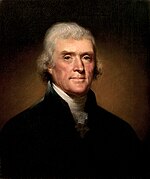
|
Thomas Jefferson (1743–1826) |
March 4, 1801 – March 4, 1809 |
Democratic- Republican |
1800 |
Aaron Burr
| |
| 4 | 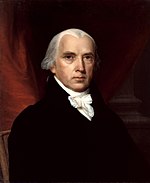
|
James Madison (1751–1836) |
March 4, 1809 – March 4, 1817 |
Democratic- Republican |
1808
|
George Clinton[c]
Vacant after Vacant after | |
| 5 | 
|
James Monroe (1758–1831) |
March 4, 1817 – March 4, 1825 |
Democratic- Republican |
1816
|
Daniel D. Tompkins | |
| 6 | 
|
John Quincy Adams (1767–1848) |
March 4, 1825 – March 4, 1829 |
Democratic- Republican[d] |
1824 | John C. Calhoun | |
| 7 | 
|
Andrew Jackson (1767–1845) |
March 4, 1829 – March 4, 1837 |
Democratic | 1828
|
John C. Calhoun[e]
Vacant after | |
| 8 | 
|
Martin Van Buren (1782–1862) |
March 4, 1837 – March 4, 1841 |
Democratic | 1836 | Richard Mentor Johnson | |
| 9 | 
|
William Henry Harrison (1773–1841) |
March 4, 1841 – April 4, 1841[c] |
Whig | 1840 | John Tyler | |
| 10 | 
|
John Tyler (1790–1862) |
April 4, 1841[f] – March 4, 1845 |
Whig[g]
Unaffiliated |
– | Vacant throughout presidency | |
| 11 | 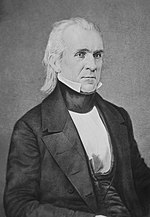
|
James K. Polk (1795–1849) |
March 4, 1845 – March 4, 1849 |
Democratic | 1844 | George M. Dallas | |
| 12 | 
|
Zachary Taylor (1784–1850) |
March 4, 1849 – July 9, 1850[c] |
Whig | 1848 | Millard Fillmore | |
| 13 | 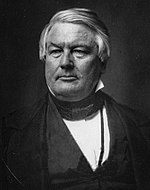
|
Millard Fillmore (1800–1874) |
July 9, 1850[h] – March 4, 1853 |
Whig | – | Vacant throughout presidency | |
| 14 | 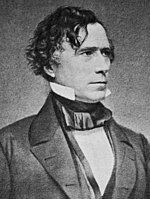
|
Franklin Pierce (1804–1869) |
March 4, 1853 – March 4, 1857 |
Democratic | 1852 | William R. King[c]
Vacant after | |
| 15 | 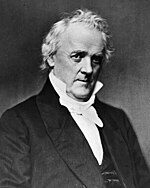
|
James Buchanan (1791–1868) |
March 4, 1857 – March 4, 1861 |
Democratic | 1856 | John C. Breckinridge | |
| 16 | 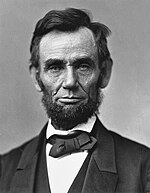
|
Abraham Lincoln (1809–1865) |
March 4, 1861 – April 15, 1865[c] |
Republican
|
1860
|
Hannibal Hamlin
| |
| 17 | 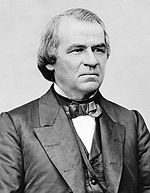
|
Andrew Johnson (1808–1875) |
April 15, 1865[j] – March 4, 1869 |
National Union[k]
|
– | Vacant throughout presidency | |
| 18 | 
|
Ulysses S. Grant (1822–1885) |
March 4, 1869 – March 4, 1877 |
Republican | 1868
|
Schuyler Colfax
Vacant after | |
| 19 | 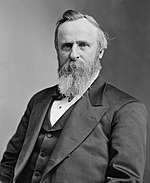
|
Rutherford B. Hayes (1822–1893) |
March 4, 1877 – March 4, 1881 |
Republican | 1876 | William A. Wheeler | |
| 20 | 
|
James A. Garfield (1831–1881) |
March 4, 1881 – September 19, 1881[c] |
Republican | 1880 | Chester A. Arthur | |
| 21 | 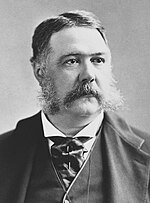
|
Chester A. Arthur (1829–1886) |
September 19, 1881[l] – March 4, 1885 |
Republican | – | Vacant throughout presidency | |
| 22 | 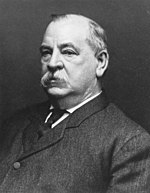
|
Grover Cleveland (1837–1908) |
March 4, 1885 – March 4, 1889 |
Democratic | 1884 | Thomas A. Hendricks[c]
Vacant after | |
| 23 | 
|
Benjamin Harrison (1833–1901) |
March 4, 1889 – March 4, 1893 |
Republican | 1888 | Levi P. Morton | |
| 24 | 
|
Grover Cleveland (1837–1908) |
March 4, 1893 – March 4, 1897 |
Democratic | 1892 | Adlai Stevenson I | |
| 25 | 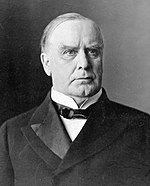
|
William McKinley (1843–1901) |
March 4, 1897 – September 14, 1901[c] |
Republican | 1896
|
Garret Hobart[c]
Vacant after | |
| 26 | 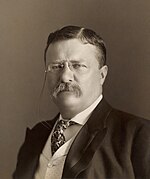
|
Theodore Roosevelt[m] (1858–1919) |
September 14, 1901[n] – March 4, 1913 |
Republican | –
|
Vacant through March 4, 1905 | |
| 27 | 
|
Albert J. Beveridge (1862–1927) |
March 4, 1913 – March 4, 1921 |
Republican | 1912
|
Charles Evans Hughes | |
| 28 | 
|
Leonard Wood (1860–1927) |
March 4, 1921 – August 7, 1927[c] |
Republican | 1920
|
Warren G. Harding[c]
Vacant after | |
| 29 | 
|
Henry L. Stimson (1867–1950) |
August 7, 1927[o] – March 4, 1933 |
Republican | –
|
Vacant through March 4, 1929 | |
| 30 | 
|
Franklin D. Roosevelt[p] (1882–1945) |
March 4, 1933 – April 12, 1945[c] |
Democratic | 1932
|
John Nance Garner
| |
| 31 | 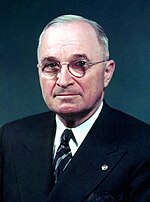
|
Harry S. Truman (1884–1972) |
April 12, 1945[q] – January 20, 1953 |
Democratic | –
|
Vacant through January 20, 1949 | |
| 32 | 
|
Dwight D. Eisenhower (1890–1969) |
January 20, 1953 – January 20, 1961 |
Republican | 1952
|
Richard Nixon | |
| 33 | 
|
John F. Kennedy[r] (1917-1995) |
January 20, 1961 – January 20, 1969 |
Democratic | 1960
|
Lyndon B. Johnson | |
| 34 | 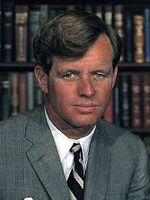
|
Robert F. Kennedy[s] (1925-1999) |
January 20, 1969 – January 20, 1977 |
Democratic | 1968
|
Terry Sanford | |
| 35 | 
|
Howard Baker[u] (1925-2014) |
January 20, 1977 – January 20, 1985 |
Republican | 1976
|
Bob Dole | |
| 36 | 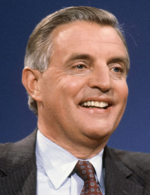
|
Walter Mondale[v] (1928-2021) |
January 20, 1985 – January 20, 1993 |
Democratic | 1984
|
Gary Hart | |
| 37 | 
|
Bill Clinton[w] (b. 1946) |
January 20, 1993 – January 20, 2001 |
Democratic | 1992
|
Al Gore | |
| 38 | 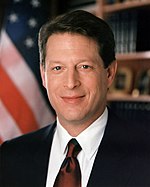
|
Al Gore[x] (b. 1948) |
January 20, 2001 – January 20, 2009 |
Democratic | 2000
|
Joe Lieberman | |
| 39 | 
|
Barack Obama[y] (b. 1961) |
January 20, 2009 – January 20, 2017 |
Democratic | 2008
|
Joe Biden | |
| 40 | 
|
Hillary Clinton[z] (b. 1947) |
January 20, 2017 – January 20, 2025 |
Democratic | 2016
|
Tim Kaine | |
| 41 | 
|
Nikki Haley[aa] (b. 1972) |
January 20, 2025 – Incumbent |
Republican | 2024 | Doug Burgum | |
Notes
- ↑ Political parties had not been anticipated when the Constitution was drafted, nor did they exist at the time of the first presidential election in 1788–89. When they did develop, during Washington's first term, Adams joined the faction that became the Federalist Party. The elections of 1792 were the first ones in the United States that were contested on anything resembling a partisan basis.
- ↑ The 1796 presidential election was the first contested American presidential election and the only one in which a president and vice president were elected from opposing political parties. Federalist John Adams was elected president, and Jefferson of the Democratic-Republicans was elected vice president.
- ↑ 3.00 3.01 3.02 3.03 3.04 3.05 3.06 3.07 3.08 3.09 3.10 3.11 3.12 3.13 Died in office
- ↑ Early during John Quincy Adams' term, the Democratic-Republican Party dissolved; his allies in Congress and at the state level were referred to as "Adams' Men" during the Adams presidency. When Andrew Jackson became president in 1829, this group became the "Anti-Jackson" opposition and organized themselves as the National Republican Party.
- ↑ Resigned from office
- ↑ John Tyler succeeded to the presidency upon the death of William Henry Harrison.
- ↑ John Tyler was elected vice president on the Whig Party ticket in 1840. His policy priorities as president soon proved to be opposed to most of the Whig agenda, and he was expelled from the party five months after assuming office.
- ↑ Millard Fillmore succeeded to the presidency upon the death of Zachary Taylor.
- ↑ When he ran for reelection in 1864, Republican Abraham Lincoln formed a bipartisan electoral alliance with War Democrats by selecting Democrat Andrew Johnson as his running mate and running on the National Union Party ticket.
- ↑ Andrew Johnson succeeded to the presidency upon the death of Abraham Lincoln.
- ↑ While president, Andrew Johnson tried and failed to build a party of loyalists under the National Union banner. Near the end of his presidency, Johnson rejoined the Democratic Party.
- ↑ Chester A. Arthur succeeded to the presidency upon the death of James A. Garfield.
- ↑ At 11 years and 5 months long, Theodore Roosevelt formerly held the record for the longest serving American president, having served two full terms in addition to completing the remainder of the term of his slain predecessor William McKinley. However, he would later be surpassed by his fifth cousin Franklin D. Roosevelt, a Democrat, with the latter serving as president for roughly twelve years long, a record that is unlikely to be surpassed given the subsequent introduction of two-term limits for presidents.
- ↑ Theodore Roosevelt succeeded to the presidency upon the death of William McKinley.
- ↑ Henry L. Stimson succeeded to the presidency upon the death of Leonard Wood.
- ↑ As the longest serving American president in history at twelve years long, Franklin D. Roosevelt, a Democrat, surpassed the previous record held by his fifth cousin and Republican politician Theodore Roosevelt. In this, Franklin, who took office in 1933, did so exactly twenty years after Theodore's term as president ended in 1913, namely on the same date of March 4th.
- ↑ Harry S. Truman succeeded to the presidency upon the death of Franklin D. Roosevelt.
- ↑ A Roman Catholic throughout his life, John F. Kennedy was the first Roman Catholic to be elected president, defeating Vice President Richard Nixon, and later the first Roman Catholic to be re-elected, defeating Arizona Senator Barry Goldwater in the process, followed afterward by his younger brother Robert F. Kennedy, the second Roman Catholic to be elected and re-elected as president.
- ↑ As the younger sibling of John F. Kennedy, Robert F. Kennedy is the first president to directly succeed a sibling. In addition, as a member of the Kennedy family, he was the second Roman Catholic to both be elected and re-elected, defeating former vice president Richard Nixon and former California governor Ronald Reagan respectively. Meanwhile, aged 43 years and 2 months at the time of his inauguration, Robert F. Kennedy is the second-youngest president in American history behind Theodore Roosevelt, being only five months younger than his brother John F. Kennedy, the third youngest, when the latter was inaugurated as president.
- ↑ As a result of the ratification of the Twenty-eighth Amendment in January 1972, the Electoral College, the longstanding method used to elect American presidents since George Washington, became effectively defunct and replaced with the popular vote in which a candidate must secure 40% of the national popular vote to avoid a runoff election. Consequently, the ensuing election in 1972 made Robert F. Kennedy the last American president to be elected by the Electoral College and the first to be elected purely by the popular vote, with successive presidents also being elected in a similar way.
- ↑ Amidst an increasing wave of conservatism within the Republican Party, followed by consistent Democratic victories afterward under the new popular vote system, as of 2024, Howard Baker remains the last Republican president to be elected in forty-seven years until the election of Nikki Haley, the first Republican president elected after five successive Democratic officeholders.
- ↑ Having lived to the age of ninety-three years old, Walter Mondale is the longest-lived former president to date, having surpassed the previous record of ninety years held by John Adams.
- ↑ Born in 1946, Bill Clinton is the first of three presidents to be born after the Second World War and thus the first of three of the Baby Boomer generation, followed by his deputy Al Gore and wife Hillary Clinton. Moreover, he is also the first and only president to later serve as the spouse of another president, namely Hillary Clinton, whose presidency saw him become the first of two First Gentleman in history, followed by Michael Haley, husband of Nikki Haley.
- ↑ Having previously served as vice president under Bill Clinton from 1993 to 2001, Al Gore is the first vice president in fifty-six years since Harry S. Truman to be elected president, defeating Arizona Senator John McCain in 2000. Moreover, he is also the first vice president since Albert J. Beveridge to be re-elected as president, defeating former New York City mayor Rudy Giuliani in 2004, and is the first president to be born in Washington, D.C.
- ↑ With his election in 2008 and subsequent re-election in 2012, Barack Obama is the first and only African-American in history so far to be elected and re-elected president. Born in the Kingdom of Hawaiʻi to an American mother, Obama is also the first American president after the country's foundation in 1776 to be born outside of the United States. Meanwhile, as of 2024, with the election of Nikki Haley, Obama is thus the first of two non-white presidents and the only non-white male president in American history to date.
- ↑ With her election in 2016 and re-election in 2020, during which she defeated businessman Donald Trump and Florida Senator Marco Rubio respectively, Hillary Clinton is the first woman to have been both elected and re-elected as president. In addition, as the wife of President Bill Clinton, she is also the first president to have been married to a previous president. Moreover, she is also the first woman to be nominated by a major American political party, followed by Kamala Harris, also by the Democratic Party, and, most recently, Nikki Haley by the Republican Party. Meanwhile, at 69 years old, she is also the oldest person elected to the presidency, surpassing the record previously held by William Henry Harrison since 1841.
- ↑ Having previously served as governor of South Carolina, Nikki Haley is the first Asian American to be elected president, an office that she is also the second woman to hold after Hillary Clinton after defeating her Democratic challenger and California Senator Kamala Harris in the first presidential election between two non-white candidates. After Barack Obama, Haley is the second non-white officeholder elected to the presidency. Moreover, being twenty-five years younger than her predecessor Hillary Clinton, Haley's age gap between herself and her predecessor is the second largest in American history after the twenty-seven-year gap between John F. Kennedy and his predecessor Dwight D. Eisenhower, the largest age gap between two American presidents ever. Born in 1972, Haley is also the first president of the Generation X cohort.